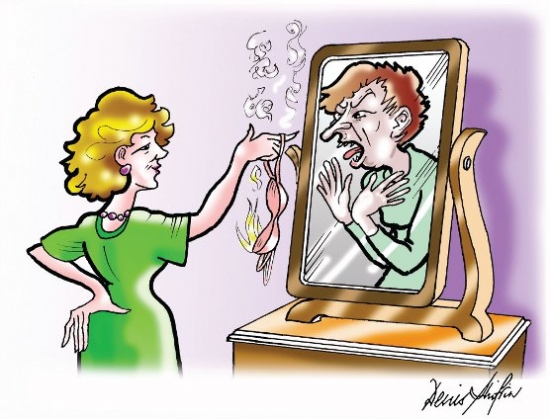
Illustration by Denis Shifrin.
Critical voices stop women from pushing beyond their comfort zone, from taking risks and from achieving more. They make women depressed, invite them to criticize each other, stop them from giving each other support and make them feel alone.
Some time ago I got a brief lesson in the sad state of our inner emotional world. A list was created on the Internet for like-minded people from around the world who want to communicate with each other by email and give their opinions on a topic of mutual interest. In this case we were all academics interested in a common field of study. As part of this process, the participants introduced themselves to the others, giving me a chance to “meet” people in my field from India, China, Europe, the US and South America. There were two things each introduction had in common. One, we were all women. Two, each person apologized for not being as accomplished, successful, professional, learned, smart or productive as all the others. Typical comments were: “'I am not sure I should even be on this list…I am only a graduate student', or 'I am only a teacher of a few courses'…or 'I have only been working a few years'…etc.”
Women are outstanding in their ability to evaluate themselves as not outstanding. Research shows that while men tend to overestimate their accomplishments, women underestimate theirs. In elementary school, girls’ grades are actually higher than boys, but the girls rate their grades as lower than those of the boys. Research also shows that while boys tend to attribute their successes to their own talents and personal efforts, girls tend to think their successes were because of luck. So it is no surprise that women’s self-esteem goes down every year after elementary school. Another study shows that when married couples have a fight, men tend to blame their wives and wives agree by tending to blame themselves. Well, at least they agree about one thing!
Women are notoriously plagued by “critical voices”, an internal self-monitor system that tells women they are not pretty enough, smart enough, talented enough or nice enough. Mostly these voices have been so internalized that women believe they are telling the truth. But since every woman I have encountered has them, it is obvious that these voices are not the voice of truth but have been learned from growing up female. The voices are a result of years of trying to be a “good” girl, a “nice” girl and most important, an “attractive girl” - and from years of messages which say you are not good enough, nice enough and certainly not attractive enough.
I have yet to meet a woman who doesn’t hate some part of her body. But how could women love their bodies when the standard is Cindy Crawford (who probably hates some part of her body too). Recently I saw a woman at the airport who was absolutely gorgeous, and was probably a model or movie star. But then I realized that everyone else was staring at her as well and I realized why. She looked totally different from the rest of us. Yes, she was lovely to look at, but she could have been from another planet; she looked so much like an alien species in her extreme beauty. It was painfully apparent to me that the model of beauty we women use to compare ourselves with is actually a freak - not at all like anyone else around. So if the vast majority compares itself to the infinitesimal minority, obviously most of us will feel lacking most of the time.
Don’t misunderstand me. I am not proposing some male conspiracy to make women feel bad about themselves. In reality, it is actually women who do most of the policing of each other. When I dress exceptionally well or badly, it is the other women at work who make comments, and not the men. Women keep each other in line, noticing minute details that men would not notice. Once, when I gave an excellent presentation, the only feedback I got from the females in the audience related to a run in my stockings. It is often other women who move the focus back to looks and away from accomplishments.
Many of my female clients find their lives transformed when they learn to resist these critical voices. In effect, therapy with women often focuses on helping women to reclaim their lives from the damaging effect of these critical voices by giving them the tools to locate what these voices are telling them. Therapy can teach women to chart out the damaging effects of these voices on their ambitions and on their self-esteem. Since most women have learned these voices from a very early age, they tend to believe them and think they are their own thoughts speaking.
One of my clients spent hours in therapy trying to convince me that she was worthless. In her opinion, she had not realized her potential. There is no doubt some truth in this, since despite being exceptionally intelligent and talented she had worked for 20 years in a dead end job she hated. Once she dreamed of being a musician, and envisioned herself playing violin in an orchestra. However, when she was turned down in an audition, she gave up on music and took any job that came along. Yes, she had married and had three successful children, but always saw herself as a failure.
Therapy with this client, whom I will call Rina, was going nowhere. Our conversations seemed to take on a routine but unproductive pattern in which I showed her the strengths she had and she showed me how little she had achieved with them. No matter what positive quality I pointed to, she used my comment as proof of her own worthlessness. If I was amazed at her verbal facility, she used her excellent command of language to prove that someone with good language skills should have already been at least an editor or a journalist. If I reinforced her mothering ability, she pointed out that any mother hen could do that and with her helping skills she should have at least become a psychologist or social worker. You couldn’t win since every good thing just served to prove her underlying badness.
Until one day I said to her: “Rina, you are really expert at putting yourself down. How do you do that? It is almost as if there is a voice inside of you that makes sure you never get to feel good about yourself. Can you tell about that voice? Who is that voice and how does it work to undermine you so badly?” Rina looked surprised and said, “Yes, sometimes it seems like a voice - almost like a separate person.” I asked her if she could give a name to her critical voice, and she immediately said “Fruma!”
Although surprised that she came up with a name so quickly, I asked her about Fruma. She had this to say: “Fruma has a frown on her face all the time, she is cruel and vicious, has squinty eyes and teeth that stick out. She hates me, and especially hates my successes. Whenever I feel a bit good about myself, Fruma pipes up with my faults and my shortcomings and reminds me of all my failures. She convinces me that I am too fat, too lazy and will never amount to anything.” I thought about the witch in children’s stories and wondered if we all carry a witch inside of us.
The next time Rina put herself down in therapy I asked her “Is that you talking or is that Fruma?” which stopped her in her tracks. She then burst out laughing. She said it was clear that it was Fruma talking, but said that she (Rina) had lived with Fruma for so long, she felt Fruma was her. By the next session Rina was talking about having paid more attention to Fruma. She had noticed that Fruma was there sabotaging her all the time. Rina had just started a new art class that might someday lead to a new profession. Fruma told her she should forget it since she probably wouldn’t use the class to get another job. Rina had thought about writing a letter to the editor of a newspaper to express her opinion about something, but Fruma had told her that her opinion was probably a repetition of everyone else’s. All week she watched Fruma putting her down, discouraging her and taking away any motivation to take risks.
Although surprising how quickly Fruma became a real person to Rina, it was also wonderful. For the first time, instead of me pointing out all of Rina’s strengths and abilities, Rina took over that role from me. She became proud that she had resisted Fruma’s negative influence during that previous week and had persisted in going to her class. She had also written the letter to the newspaper. Suddenly she and I were on the same side, both aligned against Fruma. When we parted that day I said goodbye and Rina said, “Fruma is pissed at you but says goodbye too!”
Do all women have Frumas accompanying them, undermining their confidence, putting them down and damaging their self-esteem? Critical voices in women could be given any funny name, but in reality these voices are mean, dangerous and deadly in their effects. Critical voices stop women from pushing beyond their comfort zone, stop them from taking risks and from achieving more. They make women depressed, twice as much as men. They also invite women to criticize each other, stop women from giving each other support and make women feel alone. The nasty things women say to each other about other women are really their own critical voices turned outward. When we gossip about others, we allow ourselves a vacation from our attacking voices, but at the expense of our sense of solidarity with other women. If we remember that the woman we just put down has her own Fruma to contend with, maybe we can become compassionate.
We women should unite against our internal Frumas. We could start anti-Fruma leagues or burn our bras in demonstrations against Fruma. Or each one of us could decide that Fruma has done enough damage and fight back against her nasty voice by ignoring her advice and laughing at her ideas. When another woman invites us to Fruma-inspired backstabbing behavior through nasty comments and gossip, we can refuse to join the club. We can help our daughters resist the Fruma in them by not criticizing their looks or making them feel bad about their accomplishments. What we need to realize is that critical voices have an especially strong hold on all women and that it will take all our combined efforts and resolve to throw off their influence.
Professor Claire Rabin is a professor of family therapy who started and for 10 years directed the Tel Aviv University School of Social Work's Continuing Education. She is director of the Claire Rabin Institute for Couples Therapy (www.clairerabin.co.il).
 That Certain Smile
That Certain Smile Fay Shelter 1919-2012
Fay Shelter 1919-2012 Doreen (Devorah) Goldberg 1924 – 2012
Doreen (Devorah) Goldberg 1924 – 2012 Bridesmaid recalls a very special day 59 years ago
Bridesmaid recalls a very special day 59 years ago Harry Berman
Harry Berman Sam Levin
Sam Levin Claire Rabin
Claire Rabin